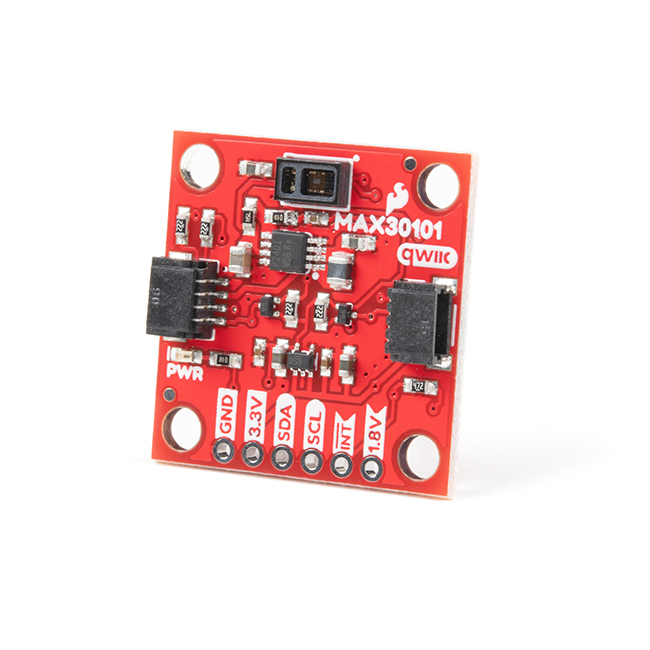SparkFun Photodetector Breakout - MAX30101 (Qwiic)
The SparkFun Photodetector Breakout is an updated version of the SparkFun Particle Sensor Breakout includes the MAX30101, a highly sensitive optical sensor and successor to the MAX30105 and MAX30102. The MAX30101 Breakout utilizes a photon detector to measure the amount of returning light that is reflected back from the LEDs. This is useful for various applications like particle (i.e. smoke) detection, proximity measurements, and even photoplethysmography. To make it even easier to use this breakout, all communication is enacted exclusively via I2C, utilizing our handy Qwiic system. However, we still have broken out 0.1" spaced pins in case you prefer to use a breadboard.
For more accurate and reliable biometric readings, we recommend the SparkFun Pulse Oximeter and Heart Rate Sensor, which utilizes proprietary algorithms programmed on the MAX32664 Biometric Sensor Hub.
The SparkFun Qwiic connect system is an ecosystem of I2C sensors, actuators, shields and cables that make prototyping faster and less prone to error. All Qwiic-enabled boards use a common 1mm pitch, 4-pin JST connector. This reduces the amount of required PCB space, and polarized connections mean you can’t hook it up wrong.
Features:
- 1" x 1" (2.54 x 2.54 cm) Qwiic Breakout Board
- MAX30101 Sensor
- Integrated Cover Glass for Optimal, Robust Performance
- Ultra-Low Power Operation
- Built-in photodetector and red, IR, and green LEDs in a single package
- PWM control of individual LED channels
- 18-bit ADC resolution
- 10.24 MHz sample rate
- Data rate up to 3200 sps
- FIFO (First In, First Out) queue with a 32 element data buffer
- Integrated temperature sensor.
- 0.0625°C resolution
- I2C Address: 0x57 (7-bit)
- Onboard 1.8V Regulation and 5V Step-up DC/DC Converter
- 4 x 0.13" Mounting Holes
- Compatible with M3 screws
- 2 Qwiic Connectors
- 6 Breakout Pins
Documents:
- Schematic
- Eagle Files
- Board Dimensions
- Hookup Guide
- Datasheet (MAX30101)
- SparkFun MAX3010x Arduino Library
- Qwiic MAX3010x Python Package
- GitHub Hardware Repo
Videos
| Manufacturer | SparkFun |
|---|




